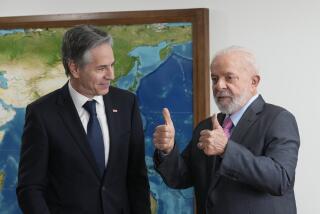Progress in Brazil
- Share via
Brazil’s new civilian government took two firm steps this week. One will help promote democracy after 20 years of military rule. The other begins the hard process of dealing with a severe economic crisis.
The first was President Jose Sarney’s decision to ask Brazil’s Congress to amend the nation’s constitution so that future presidents can be elected by the people rather than by an electoral college. Sarney’s request followed through on a campaign pledge made by Tancredo Neves, the popular president-elect who died last month before he could be inaugurated.
At the insistence of Brazil’s former military government, both Neves and Sarney were elected by Congress rather than by popular vote. The decision caused considerable political unrest at the time, including massive street protests in the country’s largest cities. Neves was able to calm that unhappiness by promising direct elections once he took office, and by agreeing to shorten his own presidential term from six to four years. An initial version of Sarney’s amendment was overwhelmingly approved by Brazil’s Congress on Thursday.
Sarney will need that political good will once the people start feeling the results of his second important decision--to impose a tough austerity program.
That move was announced by Finance Minister Francisco Dornelles, a young economist with a reputation as a no-nonsense technocrat. Before he left for New York to renegotiate the country’s $100-billion foreign debt with the International Monetary Fund, Dornelles told Congress that deep cuts will be made in government spending in order to reduce a budget deficit of $17 billion. He insisted that such austerity is the way to reduce Brazil’s runaway inflation, which reached an annual rate of 227% last month.
Dornelles’ speech will be reassuring to officials of the monetary fund and of the 600 banks that are Brazil’s creditors. But they should note that the finance minister also said that he will seek “more realistic” economic goals for the country in his meetings with them. In the last months of military rule, government officials would sign International Monetary Fund agreements setting goals for controlling inflation, increasing exports and reducing deficits that they knew could not be achieved, then use those agreements to convince commercial banks to refinance the debt. Dornelles said that this cynical practice must stop--a sign that he and other Brazilian officials are now willing to face the reality of their difficult economic situation.
In exchange for such honesty and discipline, the banks must be willing to grant Brazil the financial flexibility that it needs to keep its economy viable while paying off the debt.
More to Read
Sign up for Essential California
The most important California stories and recommendations in your inbox every morning.
You may occasionally receive promotional content from the Los Angeles Times.













